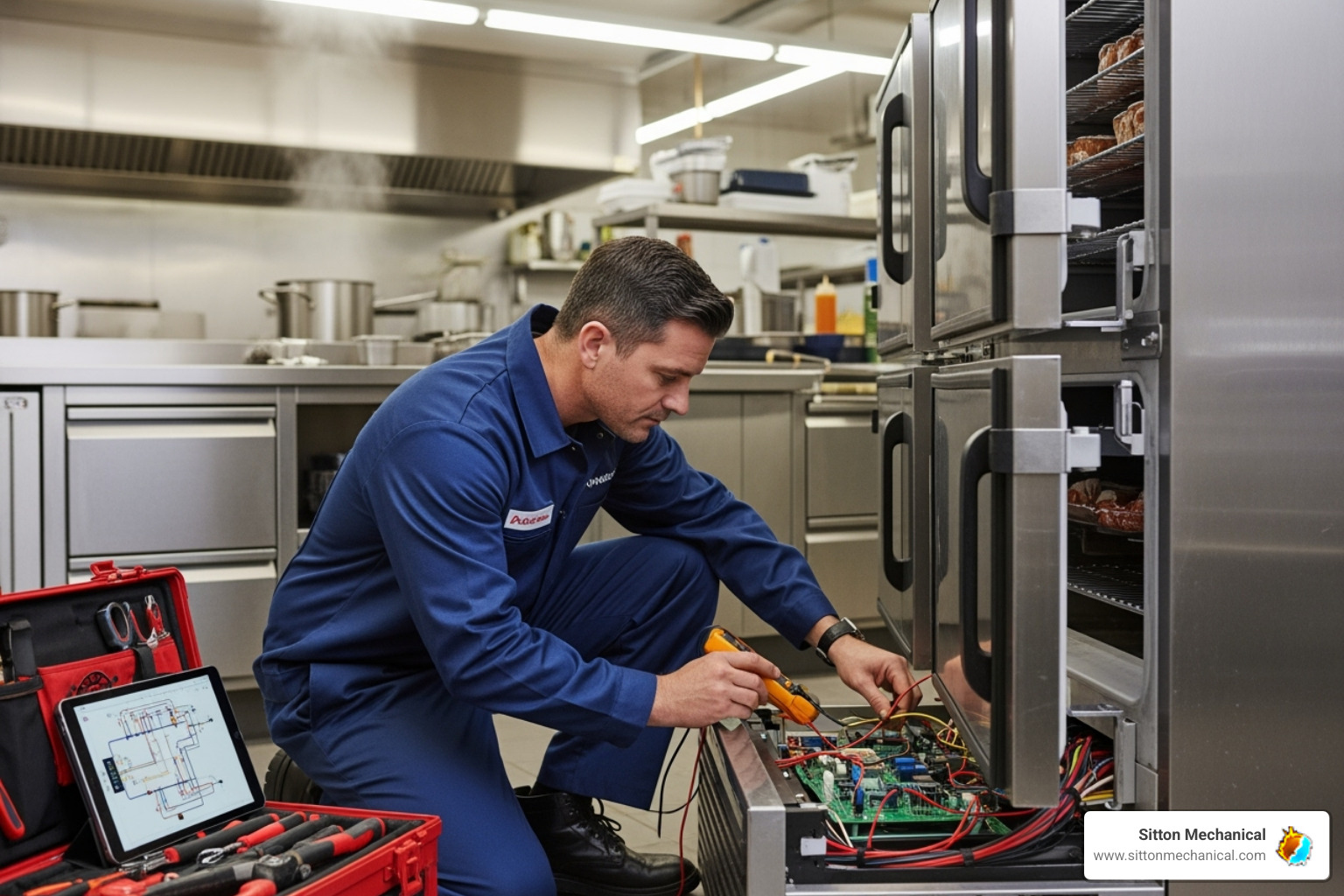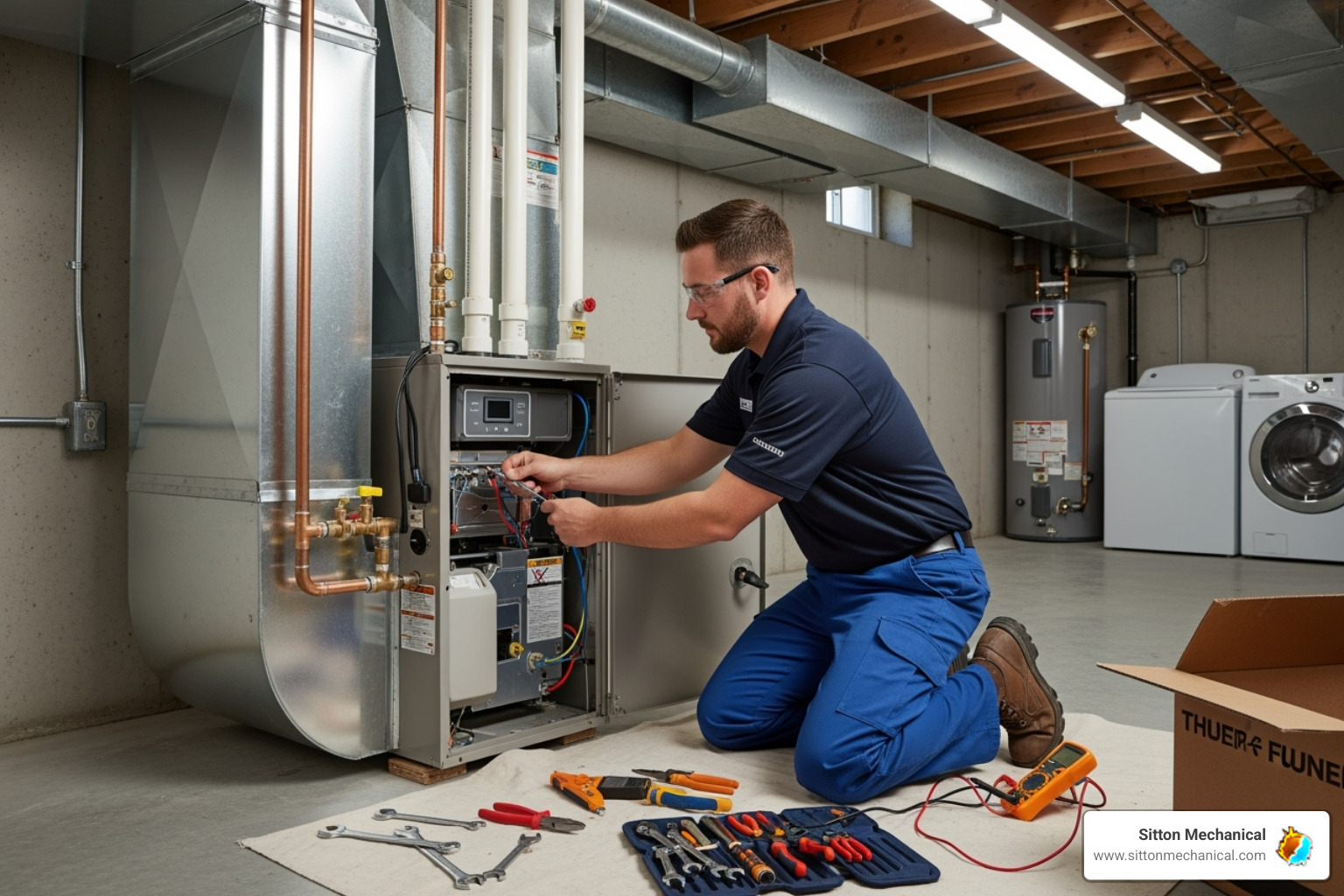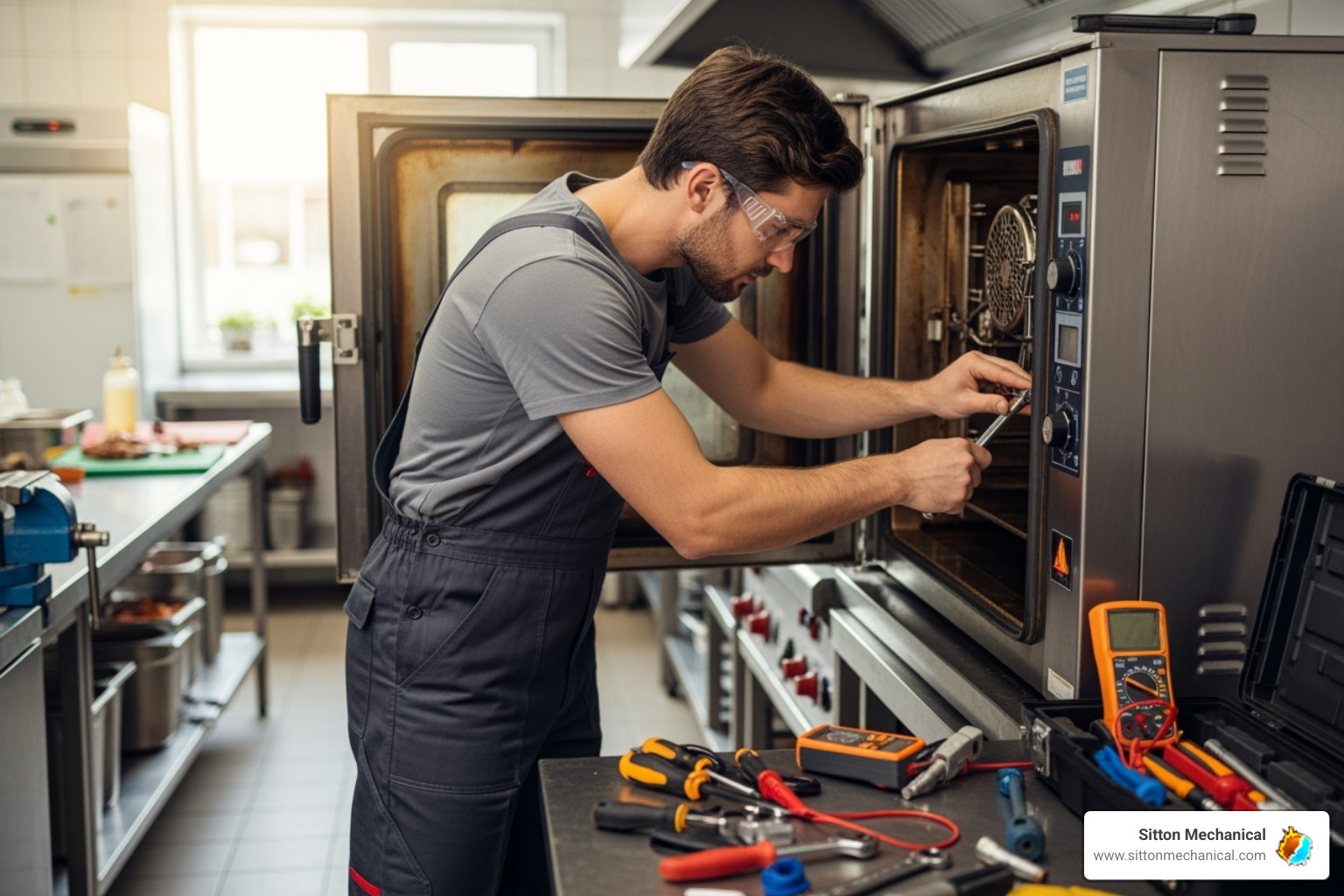Why Your HVAC System Stops Cooling When You Need It Most
When your HVAC system not cooling properly, it can quickly turn your comfortable home into an unbearable space, especially during Oklahoma's sweltering summer months. The good news is that most cooling problems have identifiable causes and solutions.
Quick Diagnosis Checklist for AC Not Cooling:
- Check thermostat settings - Ensure it's set to "Cool" and fan is on "Auto"
- Replace dirty air filter - Blocked airflow is the #1 cause of cooling problems
- Inspect outdoor unit - Clear debris and check for ice buildup
- Reset tripped breakers - Power issues prevent proper operation
- Look for refrigerant leaks - Hissing sounds or oily residue around lines
- Check vents - Ensure they're open and unobstructed
Your air conditioning system works by moving heat from inside your home to the outside through a continuous cycle. When this process breaks down, you'll notice warm air coming from your vents, higher energy bills, or your system running constantly without reaching the set temperature.
Most AC cooling problems fall into three main categories: airflow restrictions (like dirty filters), refrigerant issues (leaks or low levels), and electrical problems (faulty components or power supply issues). While some fixes are simple DIY tasks, others require professional expertise to diagnose and repair safely.
The average AC unit lasts 10-15 years, but proper maintenance can extend its life and prevent many cooling problems before they start. Understanding what to check first can save you time, money, and frustration when your system isn't performing as expected.
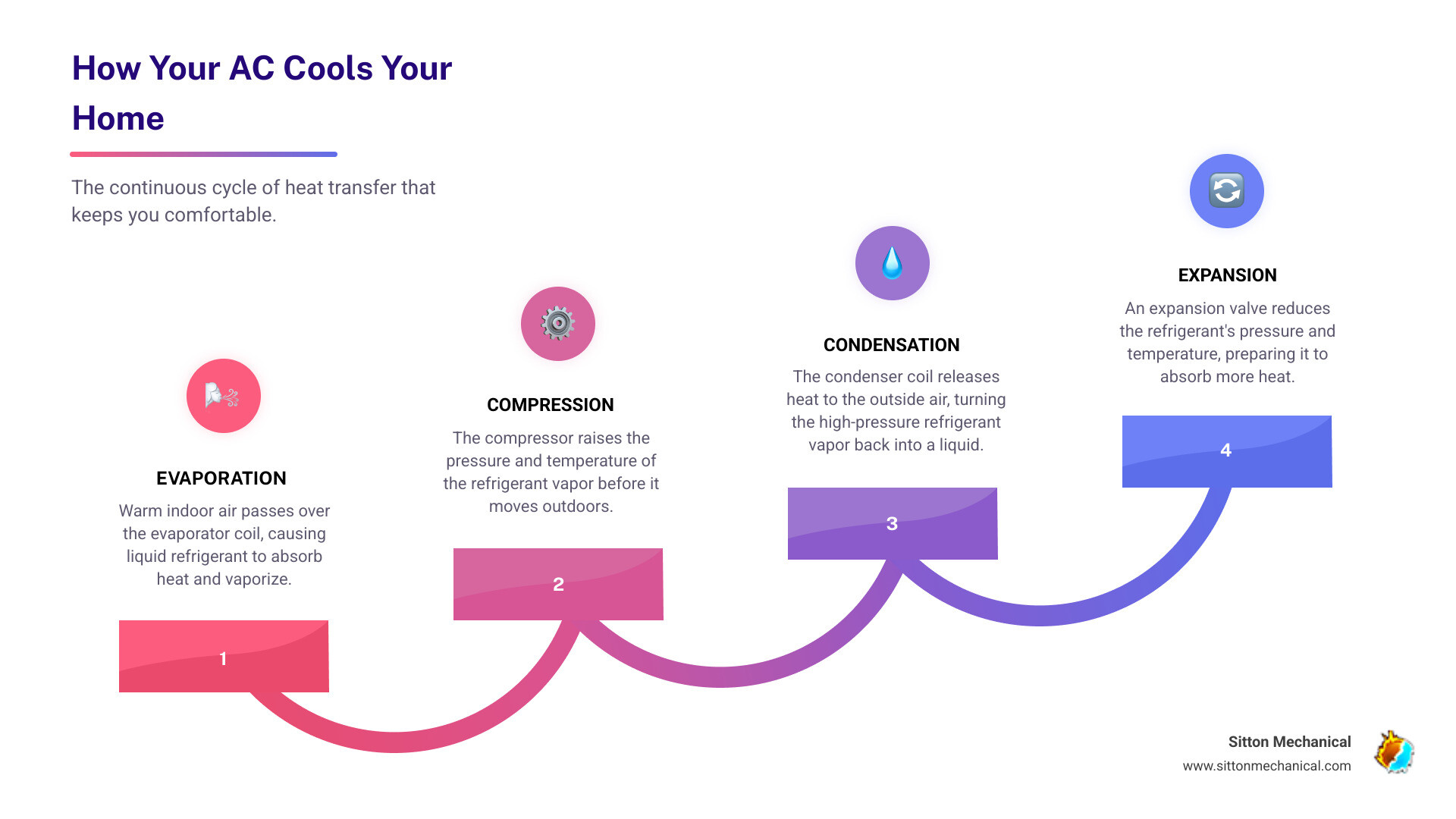
Simple DIY Troubleshooting Steps You Can Do Today
When your HVAC system not cooling properly, several straightforward checks might solve the problem without a service call. Safety first: always turn off power to your AC unit at the thermostat and circuit breaker before inspecting any components.
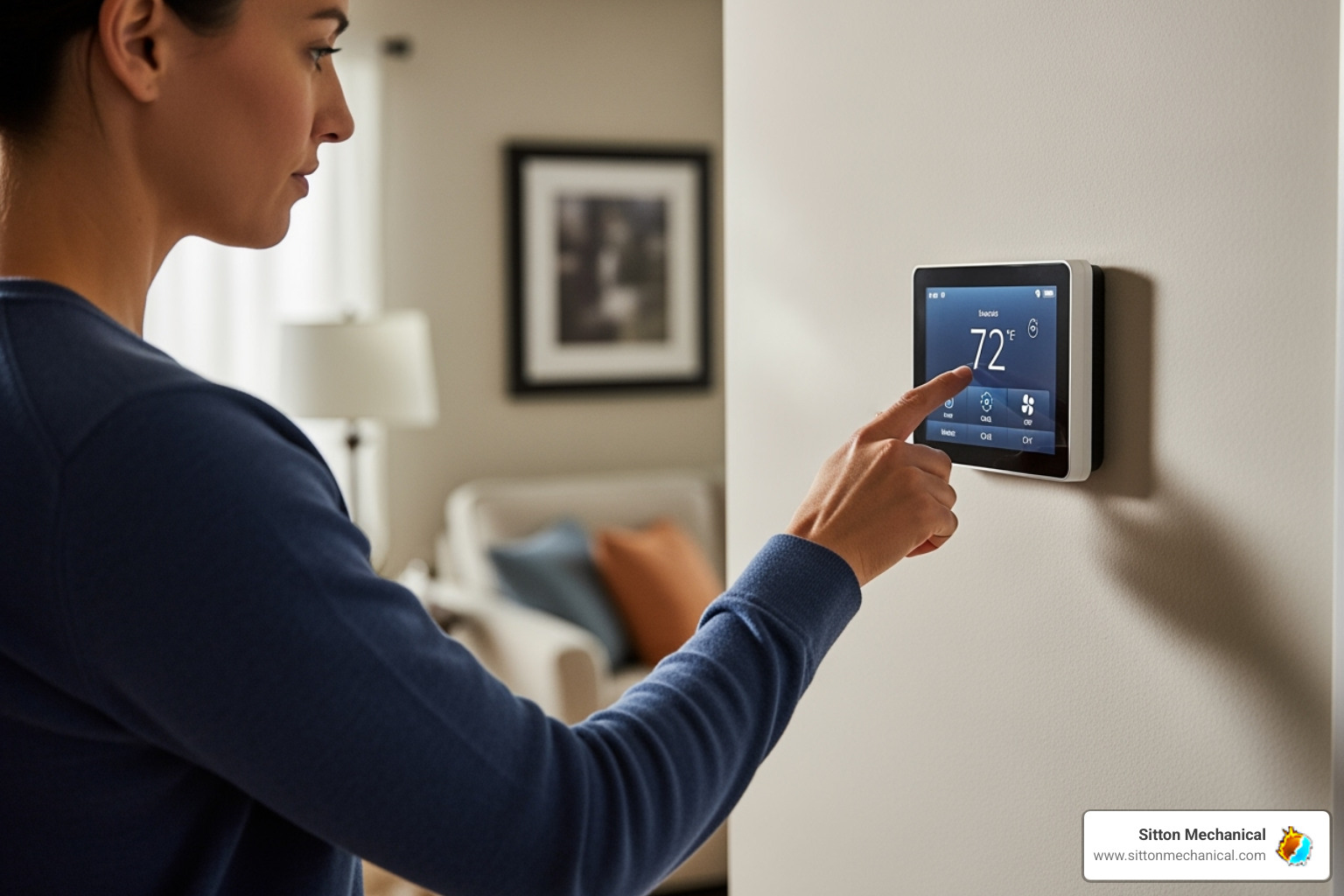
Check Your Thermostat Settings
Incorrect thermostat settings are a common cause of cooling issues. First, ensure it's set to "Cool" mode and the target temperature is lower than the current room temperature. Set the fan to "Auto" so it only runs during cooling cycles; the "On" setting circulates unconditioned air, which can make it seem like the AC isn't working.
Also, check for dead batteries, which can cause erratic behavior. Ensure the thermostat isn't located in direct sunlight or near heat-producing appliances, as this can lead to inaccurate temperature readings.
For more guidance, see our guide on AC temperature settings for maximum comfort.
Inspect and Replace Your Air Filter
A dirty air filter is the most common reason an HVAC system not cooling properly. A clogged filter restricts airflow over the evaporator coil, forcing your system to work harder and potentially causing the coil to freeze.

Check your filter monthly and replace it every 1-3 months, or more frequently if you have pets or allergies. While high-efficiency MERV-rated filters improve air quality, ensure your system is rated to handle the increased airflow restriction. Stick to the manufacturer's recommendation if you're unsure.
Our guide on keeping your AC running efficiently has more details.
Examine the Outdoor Condenser Unit
Your outdoor unit releases heat from your home. If it can't breathe, your HVAC system not cooling becomes a real problem. Check for overgrown bushes, grass, or leaves obstructing the unit.
Clear at least two feet of space around the condenser. If the coils look dirty, gently rinse them with a garden hose. Spraying from the inside out is often most effective for removing stubborn debris. A clean condenser runs more efficiently and helps prevent damage to the compressor.
If you notice other issues, our article on signs your AC condenser is failing can help.
Check for Tripped Breakers and Power Issues
Your AC may not be cooling simply because it isn't receiving power. Go to your electrical panel and look for the breaker labeled for your air conditioner. If it's in the "off" or middle "tripped" position, flip it fully off and then back to "on."
If the breaker trips again immediately, do not reset it. This indicates a serious electrical issue that requires a professional. Also, check the outdoor disconnect switch near the condenser unit to ensure it's on. Always turn off power at the main breaker before touching any electrical components.
For more information, see these circuit breaker fundamentals or our guide on AC circuit breaker problems in Stillwater.
Common Problems Causing Your HVAC System Not to Cool
If basic DIY checks don't solve the problem, the issue may be with internal components. When your HVAC system not cooling persists, it often points to one of these common culprits that require a more detailed diagnosis.
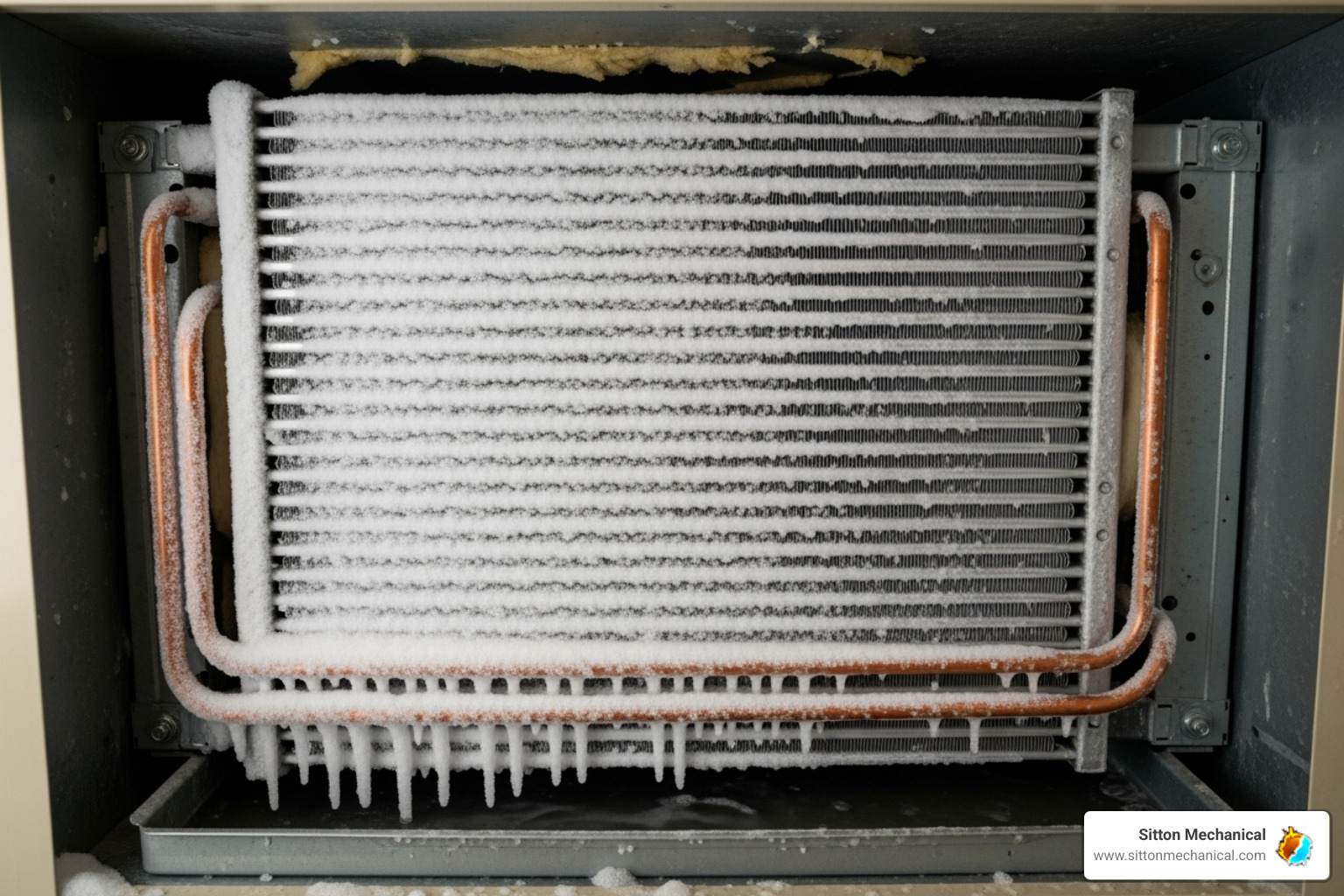
Dirty or Frozen Coils
Your AC has two coils: the indoor evaporator coil and the outdoor condenser coil. When either gets covered in dirt and debris, it can't transfer heat effectively. This often causes the evaporator coil to get too cold and freeze over.
Signs of a frozen coil include ice on the copper refrigerant lines, water leaking near the indoor unit as ice melts, and the system running constantly with little to no cool air. If you see ice, turn the AC off but leave the fan on to help it thaw, which can take several hours. Do not chip away the ice. After it thaws, replace the air filter. If it freezes again, you likely have an underlying issue that needs professional attention.
Learn more about how to prevent frozen AC coils and what to do about AC water leaks.
Refrigerant Leaks and Low Levels
Refrigerant is not consumed like fuel; it circulates in a closed loop. If your system is low on refrigerant, it has a leak. This is a critical problem because refrigerant is what absorbs heat from your home.
Signs of a leak include hissing or bubbling sounds, an oily residue on refrigerant lines, and ice buildup on the coils. A system with low refrigerant will struggle to cool, run inefficiently, and increase your energy bills. Refrigerant leaks are a health and environmental hazard and are not a DIY repair. If you suspect a leak, turn off your AC and call a certified technician to locate and repair it safely.
Find out more about low refrigerant signs in your AC system and troubleshooting AC refrigerant leak signs.
Airflow and Ductwork Issues
Even if your AC unit is working, airflow problems can prevent cool air from reaching you. Common issues include blocked supply or return vents (check for furniture or rugs covering them) and leaky ductwork. Leaky ducts are especially common in older homes and allow cool air to escape into attics or crawlspaces, leading to uneven cooling and high energy bills.
If you have weak airflow or some rooms are warmer than others, your ductwork may need professional inspection and sealing. For more information, see this overview of central air conditioning systems.
Blower Fan and Motor Problems
The blower fan, located in your indoor unit, pushes conditioned air through the ducts. If it fails, you'll get little to no airflow. Signs of a problem include weak airflow, strange noises (grinding, squealing), or the indoor fan not running while the outdoor unit is on.
A common cause is a failed capacitor, which provides the electrical jolt to start the motor. When the capacitor fails, the motor may struggle to start or not run at all. Blower motor and capacitor replacement involves high-voltage components and is best left to a professional. Learn more about why your AC fan isn't working in Perkins.
Advanced Mechanical and Electrical Failures
When basic troubleshooting doesn't work, your HVAC system not cooling may be due to a more serious internal failure. These issues often involve core components and require professional diagnosis and repair.
Compressor Malfunction
The compressor is the heart of your AC, responsible for circulating refrigerant. If it fails, you won't get any cool air. Signs of a failing compressor include loud grinding or rattling noises from the outdoor unit, a repeatedly tripping circuit breaker, or the system running without producing any cool air. In some cases, the outdoor unit won't turn on at all.
Compressor replacement is one of the most expensive AC repairs. If your system is older, a failed compressor often means it's time to consider replacing the entire unit. Understanding what causes AC compressor failure can help you decide between repair and replacement.
The Impact of System Age on an HVAC system not cooling
Even well-maintained AC systems have a lifespan of about 10-15 years. If your unit is older, its inability to cool effectively may simply be due to age. Over time, components wear out, efficiency declines, and the system struggles to keep up, leading to longer run times and higher energy bills.
As repair costs mount, replacing an old, inefficient unit often becomes the more cost-effective choice. Modern systems are far more energy-efficient, offering long-term savings on utility bills and improved comfort. We can help you determine if it's time for a new AC and provide professional AC replacement services.
Troubleshooting a Heat Pump vs. a Standard AC for an HVAC system not cooling
Heat pumps provide both heating and cooling, which means they have unique parts that can fail. The most common issue is a faulty reversing valve. If this valve gets stuck in heating mode, your heat pump will blow warm air even when set to cool.
Other issues can involve the defrost cycle controls or complex sensors. If your heat pump is blowing warm air in the summer and you've ruled out thermostat errors, the problem is likely specific to the heat pump's mechanics. These systems require specialized knowledge, so it's best to call for professional AC repair services.
When to Call a Professional and How to Prevent Future Issues
While some AC problems are simple DIY fixes, issues involving refrigerant, electrical systems, or major mechanical parts are dangerous and can be made worse by attempting a repair without proper training. Knowing when to call a professional is key.
Signs You Need to Call an HVAC Technician
It's time to call a professional if you encounter any of these red flags that indicate your HVAC system not cooling is a serious issue:
- Refrigerant Issues: Suspected leaks (hissing sounds, oily residue) require a certified technician due to health and environmental risks.
- Electrical Problems: Frayed wires, burning smells, or a breaker that repeatedly trips are serious safety hazards.
- Strange Noises: Loud grinding, screeching, or banging often points to a failing compressor or blower motor.
- Persistent Problems: If the system blows warm air continuously or coils repeatedly freeze even after you've tried basic troubleshooting, it's time for a professional diagnosis.
Our certified technicians can safely diagnose and fix these complex problems. Learn more about the Signs You Need HVAC Repair.
The Importance of Preventative Maintenance
Regular maintenance is the best way to prevent your HVAC system not cooling unexpectedly. An annual professional tune-up, ideally in the spring, prepares your system for summer heat.
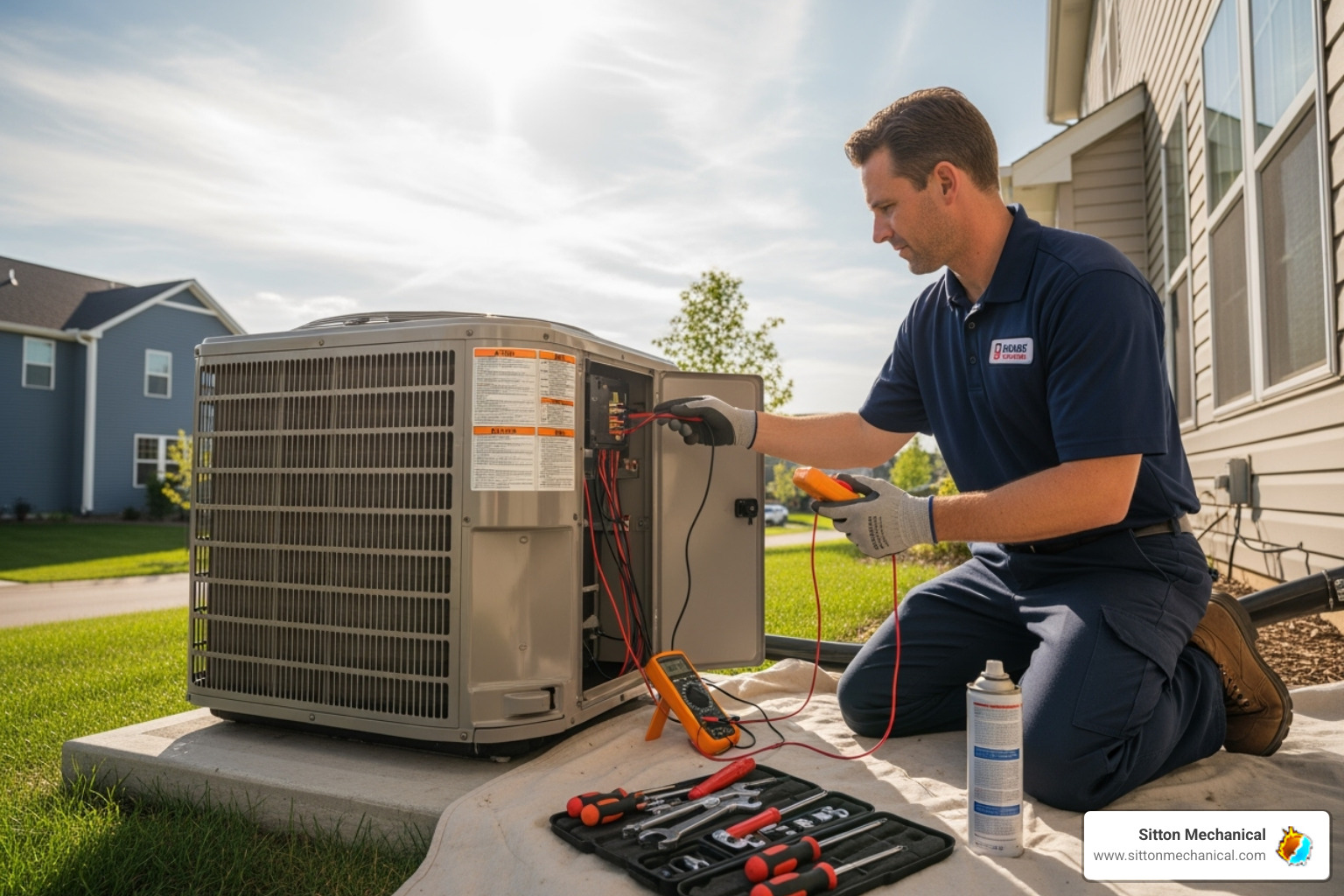
During a tune-up, a technician will clean coils, check refrigerant levels, inspect electrical connections, lubricate moving parts, and clear condensate drains. This service improves efficiency, lowers energy bills, extends the system's lifespan, and prevents costly emergency repairs. Many manufacturer warranties also require proof of regular maintenance.
Don't wait for a breakdown. Schedule your AC maintenance and find the Benefits AC Tune-Up offers.
External Factors Affecting Cooling Performance
Sometimes, your home itself can hinder your AC's performance. If your HVAC system not cooling effectively despite being in good working order, consider these factors:
- Poor Insulation: Inadequate insulation in the attic, walls, or crawlspace allows outdoor heat to enter your home easily, forcing your AC to work harder.
- Air Leaks: Gaps around windows, doors, and utility penetrations let hot air in and cool air out.
- Windows and Doors: Older, single-pane windows are a major source of heat gain. Using blinds or curtains can help.
- Extreme Heat: During Oklahoma's hottest days, even a properly functioning AC system can be pushed to its limits.
Addressing these issues by adding insulation, sealing leaks, or upgrading windows can significantly improve comfort and reduce energy costs. Our Summer AC efficiency tips offer more advice.
Frequently Asked Questions about AC Cooling Problems
We hear a lot of questions about why an HVAC system not cooling properly. Here are some of the most common ones we get from homeowners in Stillwater, Perkins, Cushing, and beyond. Trust us – you're not alone in wondering about these things!
Why is my AC running but not lowering the temperature?
When your AC runs constantly but the house doesn't get cooler, it means the heat transfer process has failed. The most common causes are:
- Low refrigerant: A leak prevents the system from absorbing enough heat from your indoor air.
- Dirty coils: Clogged evaporator or condenser coils act as an insulating blanket, blocking heat transfer.
- Undersized AC system: The unit may be too small for your home's square footage, especially during peak heat.
- Airflow restrictions: A clogged filter, blocked vents, or leaky ducts prevent cool air from circulating effectively.
While you can check filters and vents yourself, issues like refrigerant leaks or an undersized system require a professional diagnosis.
Should I turn my AC off if it's not cooling?
Yes. If your HVAC system not cooling and is blowing warm air, running non-stop, or making strange noises, turn it off immediately. Continuing to run a malfunctioning system can cause more severe and expensive damage, especially to the compressor.
Shutting the system down is particularly important if you see frozen coils, hear strange noises (grinding, screeching), or experience electrical issues like a tripping breaker. This prevents further damage and allows components to thaw while you wait for a technician.
How cold should the air coming out of my AC vents be?
The air blowing from your supply vents should be 15 to 20 degrees cooler than the air entering your return vents. This is known as the temperature differential or "Delta T."
You can measure this with a thermometer at a supply vent and a return vent after the AC has run for 15 minutes. If the difference is less than 15 degrees, it's a clear sign your HVAC system not cooling efficiently. This often points to low refrigerant, dirty coils, or airflow problems.
Stay Cool with Expert Help
When your HVAC system not cooling during an Oklahoma summer, you have a clear roadmap to find the solution. Start with the simple DIY checks: thermostat settings, air filter, outdoor unit cleanliness, and circuit breakers. These steps can often resolve the issue quickly and inexpensively.
However, more complex problems like dirty or frozen coils, refrigerant leaks, blower motor failures, or compressor issues require professional expertise. Attempting to fix these yourself can be dangerous and lead to more costly damage. For these situations, it's crucial to call a certified technician.
At Sitton Mechanical, our experienced technicians provide reliable, on-time service with upfront pricing and guaranteed work. We serve families across Stillwater, Perkins, Morrison, Glencoe, Perry, Cushing, and surrounding areas, ensuring they stay comfortable through the toughest heat.
Preventative maintenance is the best way to avoid unexpected breakdowns. Regular tune-ups keep your system efficient, extend its life, and save you money in the long run.
If your HVAC system not cooling problem persists after troubleshooting, don't wait. Our team is ready to diagnose the issue and restore your home's comfort. Contact your local HVAC contractor today to beat the heat.
Ready to Transform Your Home?




